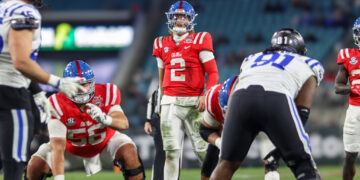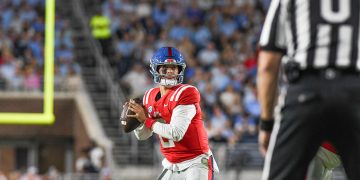The University of Mississippi Department of English invited Vanderbilt’s Cal Turner Chair in Pediatric Neurological Surgery Dr. Jay Wellons as well as UM’s own Caroline Wigginton, a chair and associate professor within the Department of English, for a public lecture entitled Next Chapters. The event took place on Monday, April 17.
Next Chapters is an annual, public discussion whose purpose is to present the life paths of accomplished alumni and clarify career possibilities for English majors.
Wellons earned an undergraduate degree in English from the University of Mississippi and received his medical degree from the University of Mississippi Medical Center.
Dr. Wellons and Professor Wigginton were joined by two senior students at the university, Edith Marie Green, an international studies major, and Lexie Carpenter, a biology major. Green and Carpenter plan to pursue doctoral degrees.
Dr. Wellons discusses the anxiety he felt going to college and deciding which direction he was going to pursue. The choice to seek a degree in English with the intent to later go to medical school satisfied this personal unease.
“It seemed very comfortable to both study literature and try to understand it from the wisdom of the people who have gone before us, but to also move into a field that I thought I could help people within,” Wellons said.
The decision to specialize in neurology was supported by Wellons’ undergraduate study of English, wherein his fascination with the nervous system was further shaped by his deep study and appreciation of soul-infused writing.
Both Wellons and Wigginton share similar, albeit opposing, journeys to their current professions. They compared their careers to “red and blue ocean” occupations. Both sides of the spectrum allow individuals to work creatively, but the red ocean theory is a field in which there is substantial competition.
Wigginton graduated from Ohio State University, earning a degree in both biochemistry and English with a focus in pre-med, and received her Ph.D. in English from the University of Texas.
Upon receiving her undergraduate degrees, Wigginton entered into a corporate job performing consulting work for a technology firm. After years of working within the corporate sphere, Wigginton decided to go back to school. Rather than medical school, she chose to pursue a career in English.
“I remembered how much I loved the conversations that I had in my high school English classes and college English classes, and I missed the intellectual conversation and discovery. I also thought I would like to teach because I really enjoyed the teaching part and the helping people aspect of the things I had done,” Wigginton said
Wigginton said that her interest in both the natural science and humanity discipline was widely beneficial to her total career trajectory. She was able to employ a narrative quality to the science she studied and an analytical quality within her literature classes.
Similarly, Wellons acknowledged that his decision to pursue English tremendously impacted his journey during medical school and throughout his career in medicine.
“It really opened up the world of the human condition,” Wellons said. “It allowed me to see patients, to communicate with them and to understand what they were moving through. … I do know that when you do both the study of people who are writing about love, and grief, and disappointment, and joy and resilience, and then you move into medicine, where the human condition and all of those emotions are all laid bare, it is a time where having an understanding of the humanistic side of things really helps you talk to families.”
The two urged students to seek out mentors to cultivate their growth throughout life.
“You will find people you want to be like, and you want those people as your mentors,” Wellons said.
Wigginton similarly posited that obtaining a committee of mentors is the best guidance she can offer to undergraduate students that seek a higher education.
Danita Chum, a freshman allied health studies major, and Kylee Pop, a freshman biochemistry major, were intrigued by the application of a humanities degree within the realm of medicine.
“As a sociology minor, I am excited to learn about the possibilities of applying my knowledge of the study of society within my future career as a nurse, specifically how this study will benefit my interactions with future patients,” Chum said.
Pop felt similarly inspired.
“From a pre-med standpoint, Dr. Wellons’ journey into medicine and Professor Wigginton’s journey into English reveals that there are different outlets you can pursue and still achieve the same goal, especially within the medical field,” Pop said.




























